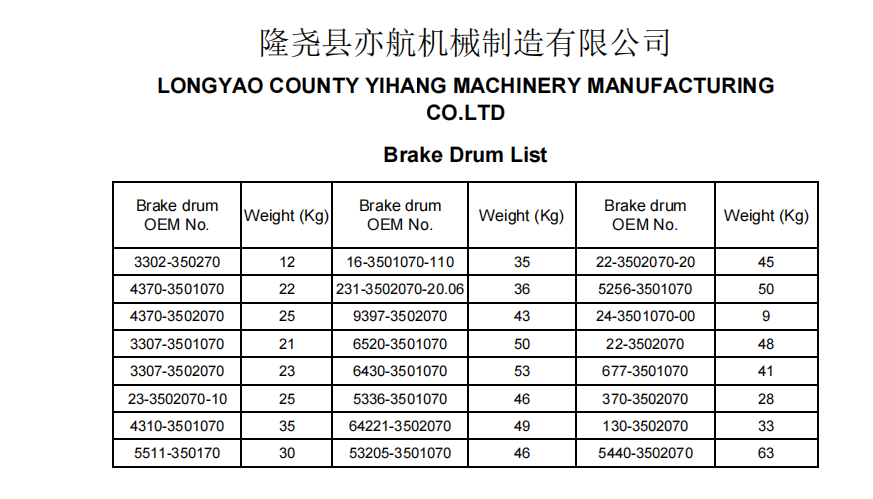Jul . 29, 2024 21:34 Back to list
Signs That Indicate You May Need to Replace Your Brake Drums Soon
Do I Need New Brake Drums? Understanding When It's Time for Replacement
Brake drums are a critical component of your vehicle's braking system, particularly in cars equipped with drum brakes. Unlike disc brakes, which utilize brake pads and rotors, drum brakes rely on shoes that press against the inner surface of the brake drum to create friction and slow down the vehicle. Over time, brake drums can wear down due to constant friction, heat, and other factors, leading many drivers to wonder if they need new brake drums. Here’s a comprehensive guide to help you understand when it might be time for a replacement.
Signs Your Brake Drums May Need Replacement
1. Unusual Noises One of the most common indicators that your brake drums may be failing is the presence of unusual noises. If you hear grinding, squeaking, or a thumping sound when you apply the brakes, it could mean that your brake pads have worn down significantly, causing metal to make contact with the drum. This situation not only indicates worn pads but may also necessitate drum replacement.
2. Vibration During Braking If you feel vibrations or pulsations in the brake pedal when you apply the brakes, this can suggest that the brake drums are warped or unevenly worn. Warpage can occur due to overheating, commonly caused by excessive braking or prolonged use in steep conditions. This uneven surface can significantly impair braking performance and may require drum replacement.
3. Decreased Brake Performance If you notice that your car takes longer to stop or struggles to come to a complete stop, your brake drums may need attention. This decreased braking efficiency could stem from worn drums, brake shoes, or both. It's vital to address these performance issues promptly to maintain safety.
4. Visible Signs of Wear Regularly inspecting your brake components can be helpful. If you can see scoring, cracks, or deep grooves in the surface of the brake drums, it's likely time for a replacement. Brake drums should have a smooth surface to ensure effective braking; any significant imperfections can compromise their effectiveness.
do i need new brake drums

5. Brake Warning Light Some modern vehicles have an indicator light on the dashboard that signals when there is a issue with the brake system. If this warning light appears, it is essential to get your vehicle inspected by a professional technician, who will assess whether the brake drums or any other components need replacement.
Maintenance and Replacement Frequency
The lifespan of brake drums varies based on several factors, including driving habits, vehicle type, and maintenance practices. On average, brake drums can last anywhere from 30,000 to 70,000 miles. However, it's essential to follow your vehicle manufacturer's recommendations and have your braking system inspected regularly.
Routine maintenance, including wheel alignment and brake fluid checks, can prolong the life of brake drums. Ensuring that your brakes are functioning correctly will not only enhance safety but also save money in the long run by preventing more extensive repairs.
Conclusion
Ultimately, ensuring your brake system's health, including the condition of your brake drums, is crucial for safe driving. If you recognize any signs indicating that your brake drums may need replacement, it is prudent to consult with a professional mechanic. Addressing brake issues early on can help you avoid costly repairs and ensure your vehicle remains safe and reliable on the road. Always remember that your brakes are one of the most vital safety features in your vehicle, and maintaining them should be a top priority.
-
Scania Brake Drums: OEM Quality for Optimal Safety & Durability
NewsAug.16,2025
-
R.V.I: Advanced Remote Visual Inspection for Precision
NewsAug.15,2025
-
Discover HYUNDA: Innovative Vehicles, Equipment & Solutions
NewsAug.14,2025
-
R.V.I: Unlock Advanced Insights & Real-time Performance
NewsAug.13,2025
-
Kamaz Brake Drum: Durable & Reliable for Heavy Duty Trucks
NewsAug.12,2025
-
Heavy Duty Iveco Brake Drum - Premium Quality & Safety
NewsAug.11,2025
